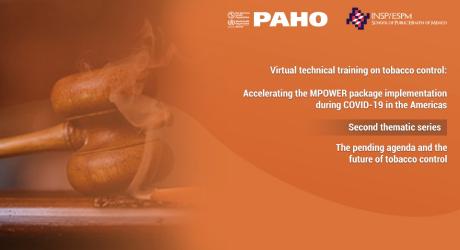Virtual Technical Training on Tobacco Control: Accelerating the MPOWER Package Implementation during COVID-19 in the Americas - The Pending Agenda and the Future of Tobacco Control (2021)

Introduction to the course
The COVID-19 pandemic, now in its second consecutive year, has not only impacted the health of the world's population but has also highlighted the importance and fragility of the social, economic, and environmental contexts that determine it. Unfortunately, this pandemic aggravates the already alarming outcomes of non-communicable diseases (NCDs) and their risk factors in the world, as people suffering from cardiovascular disease, diabetes and cancer are at higher risk for poor outcomes if they suffer from COVID-19.
The current situation in the Region of the Americas, due to the COVID-19 pandemic, creates a challenge for the prevention and control of NCD risk factors associated with lifestyles in which tobacco use, alcohol abuse, unhealthy diet and sedentary lifestyles prevail. Tobacco use, as such, is the main preventable risk factor for NCDs. In the Region of the Americas, tobacco use is responsible for 16% of deaths from cardiovascular disease, 25% from cancer, 52% from chronic respiratory diseases, and 11% from diabetes.
Measures that have been proven to be effective in reducing tobacco consumption are part of the World Health Organization (WHO) Framework Convention on Tobacco Control (FCTC). However, their implementation is not uniform throughout the world and the Region of the Americas. In order to tackle this issue, WHO launched the MPOWER package in 2008, the FCTC States Parties adopted the Global Strategy to Accelerate Tobacco Control: promoting sustainable development through implementation of the WHO FCTC 2019-2025, and the Member States of the Pan American Health Organization (PAHO) adopted the Strategy and Plan of Action to Strengthen Tobacco Control in the Region of the Americas 2018-2022.
To contribute to global tobacco control efforts, WHO is working together with partners of the Bloomberg Initiative to Reduce Tobacco Use (Bloomberg Initiative) to strengthen the implementation of the measures of the MPOWER package. In addition, for the first time, the Bloomberg Initiative, through WHO, has earmarked specific funds to strengthen the tobacco control program in the Region of the Americas, through a project running from 2021 to 2022.
Within the framework of this project, the tobacco control team of PAHO's Department of Noncommunicable Diseases and Mental Health (NMH), with technical and operational support from Mexico's National Institute of Public Health (INSP), has designed and will host a second block of their virtual training series on the MPOWER package implementation, consisting of five-sessions aimed at strengthening the technical capacity of Member States to accelerate the implementation of effective tobacco control measures. Four sessions of this training address technical topics which comprise the four modules of this online course, and the fifth session is a recap of what was previously learned.
Goal
Consolidate and integrate knowledge on tobacco control, through a critical analysis of a case study that addresses the problem of tobacco use in real contexts.
Objectives
- Disseminate and discuss the tactics of the tobacco industry in the context of the COVID-19 pandemic to attract new consumers through social media.
- Present arguments that the tobacco industry uses to avert the approval of a complete ban on tobacco advertising, promotion and sponsorship (TAPS) and other tobacco control measures that protect the right to health and information.
- Strengthen the technical capacity of Member States in multisectoral coordination to protect the autonomy of health policies and facilitate their coherence with trade and customs policies.
- Discuss future perspectives for tobacco control at the global level and in the Region of the Americas.
Public target objectives
This course is intended for representatives of PAHO/WHO Member States, delegated by governmental authorities, who include:
- The WHO FCTC or tobacco control focal point of the Ministry of Health or representative of the National Coordinating Mechanism for tobacco control (if applicable),
- Representative of the International Cooperation Department (or similar) of the Ministry of Health (preferably involved in country representation at international meetings related to tobacco control),
- Representative from the Ministry of Foreign Affairs involved in monitoring of the WHO FCTC; and
- Representative from any other Ministry/Government sector partner in the WHO FCTC implementation in the country.
In addition, this course is intended to PAHO country office focal points for tobacco control and representatives of civil society organizations in official relations with PAHO.
Duration of the course
12 hours
Course design
In this self-learning course participants can manage their own times and moments of dedication. The estimated time to complete all modules and the final evaluation is 12 hours. Ideally it can be concluded in a week or in maximum 2 weeks, according to the participant’s individual time investment.
Course Structure
- Module 1. Tactics of the tobacco industry in social media in the context of the COVID-19 pandemic.
- Module 2. Tobacco industry litigation to challenge the right to health and information: emphasis on advertising and packaging.
- Module 3. Multisectoral action: autonomy of health policies and their coherence with trade and customs policies.
- Module 4. Tobacco End Game in the Americas: future perspectives for tobacco control.
